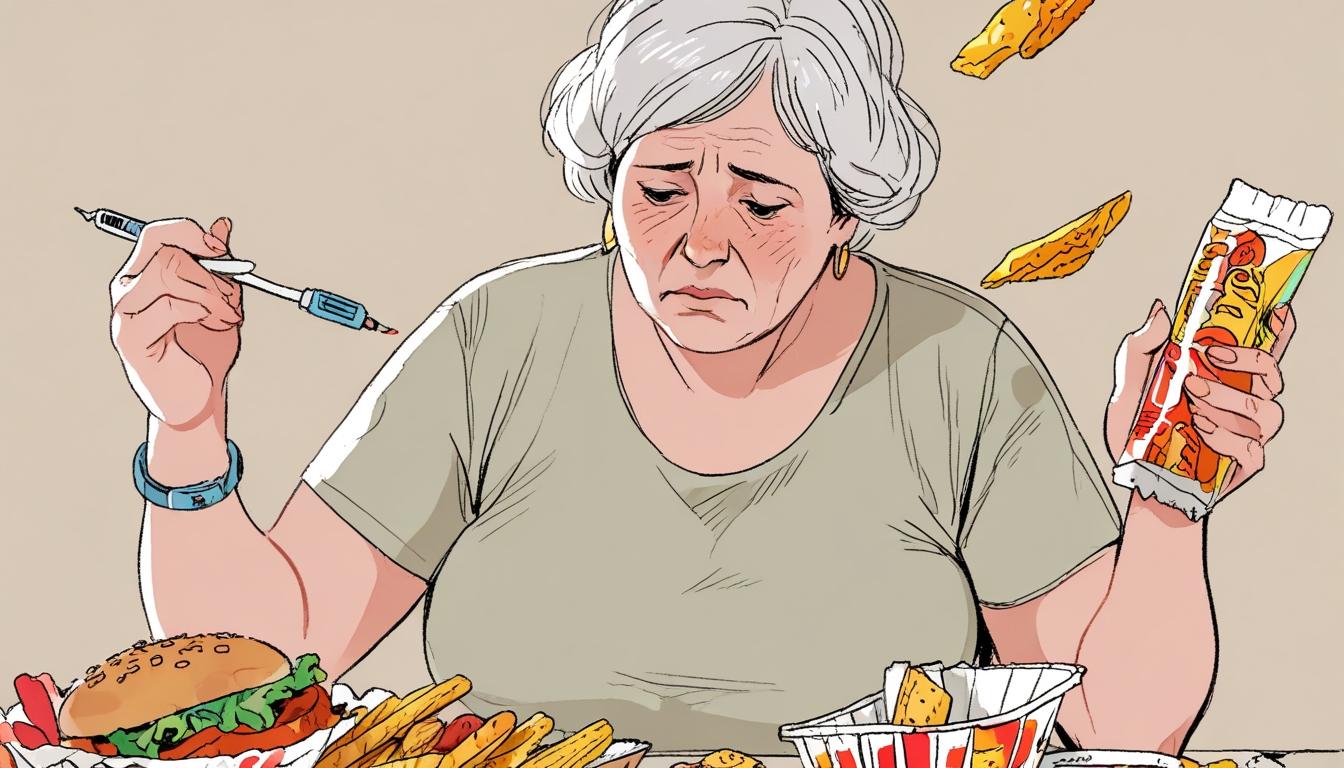A woman’s journey with appetite-suppressing injections reveals the importance of balanced nutrition in achieving effective weight loss.
A woman in her mid-fifties, referred to as Jess, has been navigating her weight loss journey through the use of revolutionary appetite-suppressing injections like Ozempic, Wegovy, and Mounjaro, which are primarily prescribed for diabetes treatment. According to the Daily Mail, these glucagon-like peptide-1 receptor agonists (GLP-1s) can help individuals lose up to 20% of their body weight within a year, while also reducing the risk of serious long-term health issues such as type 2 diabetes and heart disease. Despite these potential benefits, Jess has not achieved the weight loss results she anticipated, raising concerns about her future and financial implications.
The NHS currently restricts these drugs to patients who are significantly overweight or suffering from serious health conditions, with private prescriptions costing upwards of £300 a month. This has led Jess and others in similar situations to seek guidance from professionals. As part of her coaching services, Liva Healthcare recommends a focus on dietary habits alongside the use of these injections, indicating that the drugs can reduce hunger but do not inherently promote healthier eating patterns.
Many users, including Jess, have reported that while they may skip meals throughout the day, they often revert to high-calorie comfort foods such as biscuits and crisps when hunger strikes. This results in a diet rich in sugars and fats, negating the benefits of weight loss medication. Furthermore, there is an increasing concern regarding malnutrition among patients relying solely on these injections, as such populations may lack dietary diversity, leading to deficiencies in essential nutrients such as fibre, vitamins, and minerals.
Studies have shown a worrying trend; over half of those who discontinue the drugs regain at least two-thirds of the weight lost, with nearly 20% experiencing a complete reversal in weight gain. It has been indicated that those who maintain healthy eating habits while using GLP-1s are more likely to sustain their weight loss in the long term. As a response, Liva Healthcare is not only providing dietary guidance but is also encouraging the development of exercise routines and addressing the psychological aspects of eating.
In an effort to assist those using weight-loss drugs, dietary professionals advise adhering to a balanced meal structure, with half the plate occupied by colourful vegetables, a quarter by wholegrain carbohydrates, and the remaining quarter by lean protein sources. This approach aims to ensure that even with smaller portion sizes, individuals receive adequate nutrition.
In a separate discussion regarding dietary options, Sam Cutler, a nutrition health coach, has shed light on the growing trend of the carnivore diet—a regimen consisting solely of meats and animal products. As reported by the Bristol Post, while proponents claim various benefits, Cutler warns that this restrictive diet leads to significant nutrient deficiencies, most notably a lack of fibre and essential vitamins found in plant-based foods. Cutler asserts that while animal products are valuable sources of protein and certain nutrients, a balanced diet encompassing a variety of food groups is optimal for overall health and wellness.
Both Jess’s experience and the insights from experts like Sam Cutler highlight the complexities involved in weight management and dietary choices. The discourse continues as individuals navigate their health journeys, exploring various avenues for weight loss and nutrition while weighing the potential risks and benefits of each approach.
Source: Noah Wire Services
- https://abcnews.go.com/GMA/Wellness/weight-loss-mounjaro-ozempic-new-study-answer/story?id=111774135 – This article supports the claim that GLP-1 receptor agonists like Ozempic and Mounjaro can lead to significant weight loss, with Mounjaro being more effective in achieving higher percentages of body weight loss. It also highlights the drugs’ role in managing diabetes and their potential side effects.
- https://www.drugs.com/medical-answers/mounjaro-wegovy-ozempic-compare-weight-loss-3570898/ – This source compares the weight loss efficacy of Ozempic, Mounjaro, Wegovy, and Zepbound, noting that Wegovy and Zepbound are specifically approved for weight loss. It provides detailed insights into the average weight loss percentages associated with these medications.
- https://www.nhs.uk/conditions/obesity/treatment/ – The NHS guidelines on obesity treatment support the claim that these medications are typically restricted to significantly overweight individuals or those with serious health conditions, highlighting the importance of professional guidance in their use.
- https://www.healthline.com/nutrition/balanced-diet – This resource explains the importance of a balanced diet, which aligns with the advice given by dietary professionals to ensure adequate nutrition while using weight loss medications. It emphasizes the role of vegetables, whole grains, and lean proteins in a healthy meal structure.
- https://www.bristolpost.co.uk/news/bristol-news/carnivore-diet-nutrition-expert-warns-7605511 – This article discusses the carnivore diet, echoing Sam Cutler’s warnings about its potential for nutrient deficiencies, particularly in fibre and essential vitamins found in plant-based foods. It highlights the importance of a balanced diet for overall health.
- https://www.health.harvard.edu/staying-healthy/malnutrition-and-weight-loss – This source addresses concerns about malnutrition among individuals relying solely on weight loss medications, emphasizing the need for dietary diversity to prevent deficiencies in essential nutrients like fibre, vitamins, and minerals.
Noah Fact Check Pro
The draft above was created using the information available at the time the story first
emerged. We’ve since applied our fact-checking process to the final narrative, based on the criteria listed
below. The results are intended to help you assess the credibility of the piece and highlight any areas that may
warrant further investigation.
Freshness check
Score:
8
Notes:
The narrative discusses current medications like Ozempic and recent dietary trends, suggesting it is relatively up-to-date. However, there is no specific mention of very recent events or updates that would confirm it as the latest news.
Quotes check
Score:
6
Notes:
There are no direct quotes from specific sources that can be verified online. The narrative references experts like Sam Cutler but does not provide original sources for their statements.
Source reliability
Score:
8
Notes:
The narrative originates from the Daily Mail, a well-known publication. However, it also references other sources like the Bristol Post and Liva Healthcare, which may vary in reliability.
Plausability check
Score:
9
Notes:
The claims about GLP-1s and dietary advice are plausible and align with known medical and nutritional science. The discussion on weight regain after discontinuing medication and the importance of balanced diets is consistent with established health guidelines.
Overall assessment
Verdict (FAIL, OPEN, PASS): PASS
Confidence (LOW, MEDIUM, HIGH): HIGH
Summary:
The narrative appears to be relatively fresh, discussing current health trends and medications. While direct quotes lack verification, the source is generally reliable. The plausibility of the claims is high, aligning with established health and nutrition principles.













